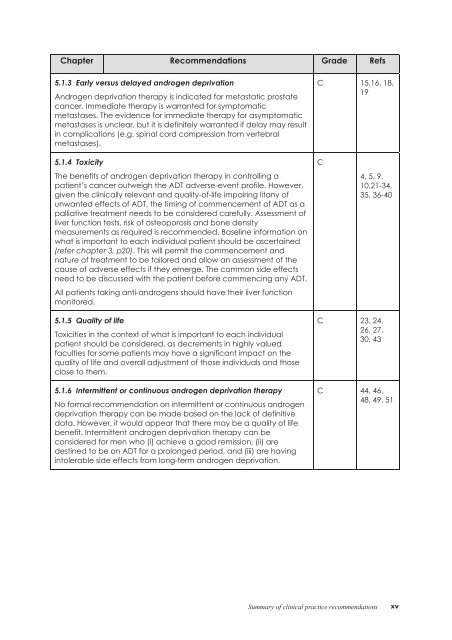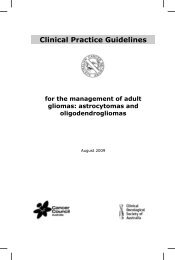Clinical Practice Guidelines for the management of locally advanced ...
Clinical Practice Guidelines for the management of locally advanced ...
Clinical Practice Guidelines for the management of locally advanced ...
You also want an ePaper? Increase the reach of your titles
YUMPU automatically turns print PDFs into web optimized ePapers that Google loves.
Chapter Recommendations Grade Refs<br />
5.1.3 Early versus delayed androgen deprivation<br />
Androgen deprivation <strong>the</strong>rapy is indicated <strong>for</strong> metastatic prostate<br />
cancer. Immediate <strong>the</strong>rapy is warranted <strong>for</strong> symptomatic<br />
metastases. The evidence <strong>for</strong> immediate <strong>the</strong>rapy <strong>for</strong> asymptomatic<br />
metastases is unclear, but it is definitely warranted if delay may result<br />
in complications (e.g. spinal cord compression from vertebral<br />
metastases).<br />
5.1.4 Toxicity<br />
The benefits <strong>of</strong> androgen deprivation <strong>the</strong>rapy in controlling a<br />
patient’s cancer outweigh <strong>the</strong> ADT adverse-event pr<strong>of</strong>ile. However,<br />
given <strong>the</strong> clinically relevant and quality-<strong>of</strong>-life impairing litany <strong>of</strong><br />
unwanted effects <strong>of</strong> ADT, <strong>the</strong> timing <strong>of</strong> commencement <strong>of</strong> ADT as a<br />
palliative treatment needs to be considered carefully. Assessment <strong>of</strong><br />
liver function tests, risk <strong>of</strong> osteoporosis and bone density<br />
measurements as required is recommended. Baseline in<strong>for</strong>mation on<br />
what is important to each individual patient should be ascertained<br />
(refer chapter 3, p20). This will permit <strong>the</strong> commencement and<br />
nature <strong>of</strong> treatment to be tailored and allow an assessment <strong>of</strong> <strong>the</strong><br />
cause <strong>of</strong> adverse effects if <strong>the</strong>y emerge. The common side effects<br />
need to be discussed with <strong>the</strong> patient be<strong>for</strong>e commencing any ADT.<br />
All patients taking anti-androgens should have <strong>the</strong>ir liver function<br />
monitored.<br />
5.1.5 Quality <strong>of</strong> life<br />
Toxicities in <strong>the</strong> context <strong>of</strong> what is important to each individual<br />
patient should be considered, as decrements in highly valued<br />
faculties <strong>for</strong> some patients may have a significant impact on <strong>the</strong><br />
quality <strong>of</strong> life and overall adjustment <strong>of</strong> those individuals and those<br />
close to <strong>the</strong>m.<br />
5.1.6 Intermittent or continuous androgen deprivation <strong>the</strong>rapy<br />
No <strong>for</strong>mal recommendation on intermittent or continuous androgen<br />
deprivation <strong>the</strong>rapy can be made based on <strong>the</strong> lack <strong>of</strong> definitive<br />
data. However, it would appear that <strong>the</strong>re may be a quality <strong>of</strong> life<br />
benefit. Intermittent androgen deprivation <strong>the</strong>rapy can be<br />
considered <strong>for</strong> men who (i) achieve a good remission, (ii) are<br />
destined to be on ADT <strong>for</strong> a prolonged period, and (iii) are having<br />
intolerable side effects from long-term androgen deprivation.<br />
C 15,16, 18,<br />
19<br />
C<br />
4, 5, 9,<br />
10,21-34,<br />
35, 36-40<br />
C 23, 24,<br />
26, 27,<br />
30, 43<br />
C 44, 46,<br />
48, 49, 51<br />
Summary <strong>of</strong> clinical practice recommendations<br />
xv



